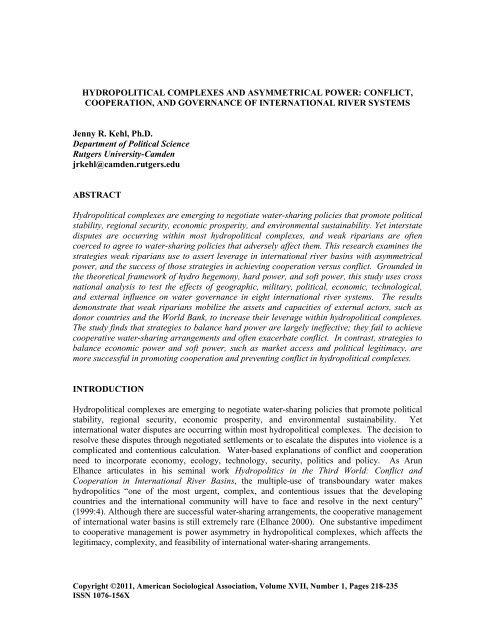Entire Volume 17 issue 1 - Journal of World-Systems Research ...
Entire Volume 17 issue 1 - Journal of World-Systems Research ...
Entire Volume 17 issue 1 - Journal of World-Systems Research ...
Create successful ePaper yourself
Turn your PDF publications into a flip-book with our unique Google optimized e-Paper software.
HYDROPOLITICAL COMPLEXES AND ASYMMETRICAL POWER: CONFLICT,<br />
COOPERATION, AND GOVERNANCE OF INTERNATIONAL RIVER SYSTEMS<br />
Jenny R. Kehl, Ph.D.<br />
Department <strong>of</strong> Political Science<br />
Rutgers University-Camden<br />
jrkehl@camden.rutgers.edu<br />
ABSTRACT<br />
Hydropolitical complexes are emerging to negotiate water-sharing policies that promote political<br />
stability, regional security, economic prosperity, and environmental sustainability. Yet interstate<br />
disputes are occurring within most hydropolitical complexes, and weak riparians are <strong>of</strong>ten<br />
coerced to agree to water-sharing policies that adversely affect them. This research examines the<br />
strategies weak riparians use to assert leverage in international river basins with asymmetrical<br />
power, and the success <strong>of</strong> those strategies in achieving cooperation versus conflict. Grounded in<br />
the theoretical framework <strong>of</strong> hydro hegemony, hard power, and s<strong>of</strong>t power, this study uses cross<br />
national analysis to test the effects <strong>of</strong> geographic, military, political, economic, technological,<br />
and external influence on water governance in eight international river systems. The results<br />
demonstrate that weak riparians mobilize the assets and capacities <strong>of</strong> external actors, such as<br />
donor countries and the <strong>World</strong> Bank, to increase their leverage within hydropolitical complexes.<br />
The study finds that strategies to balance hard power are largely ineffective; they fail to achieve<br />
cooperative water-sharing arrangements and <strong>of</strong>ten exacerbate conflict. In contrast, strategies to<br />
balance economic power and s<strong>of</strong>t power, such as market access and political legitimacy, are<br />
more successful in promoting cooperation and preventing conflict in hydropolitical complexes.<br />
INTRODUCTION<br />
Hydropolitical complexes are emerging to negotiate water-sharing policies that promote political<br />
stability, regional security, economic prosperity, and environmental sustainability. Yet<br />
international water disputes are occurring within most hydropolitical complexes. The decision to<br />
resolve these disputes through negotiated settlements or to escalate the disputes into violence is a<br />
complicated and contentious calculation. Water-based explanations <strong>of</strong> conflict and cooperation<br />
need to incorporate economy, ecology, technology, security, politics and policy. As Arun<br />
Elhance articulates in his seminal work Hydropolitics in the Third <strong>World</strong>: Conflict and<br />
Cooperation in International River Basins, the multiple-use <strong>of</strong> transboundary water makes<br />
hydropolitics “one <strong>of</strong> the most urgent, complex, and contentious <strong>issue</strong>s that the developing<br />
countries and the international community will have to face and resolve in the next century”<br />
(1999:4). Although there are successful water-sharing arrangements, the cooperative management<br />
<strong>of</strong> international water basins is still extremely rare (Elhance 2000). One substantive impediment<br />
to cooperative management is power asymmetry in hydropolitical complexes, which affects the<br />
legitimacy, complexity, and feasibility <strong>of</strong> international water-sharing arrangements.<br />
Copyright ©2011, American Sociological Association, <strong>Volume</strong> XVII, Number 1, Pages 218-235<br />
ISSN 1076-156X





